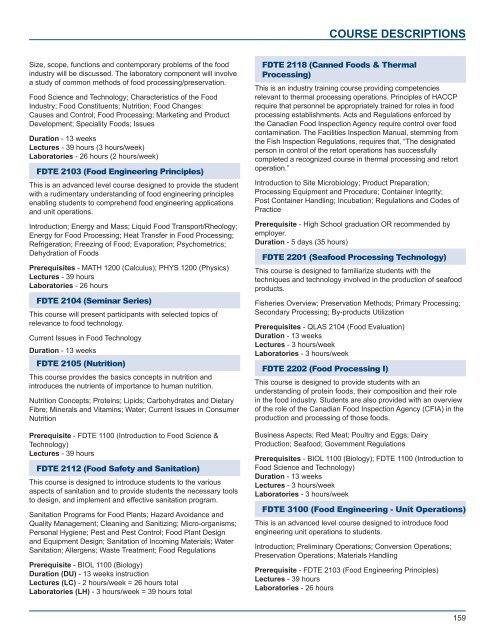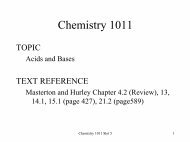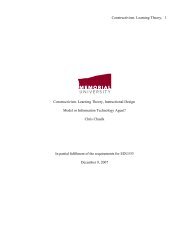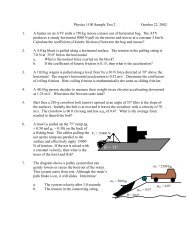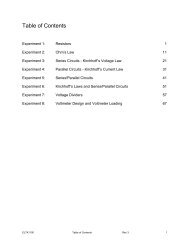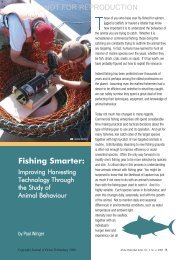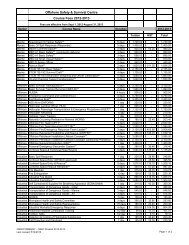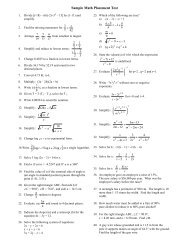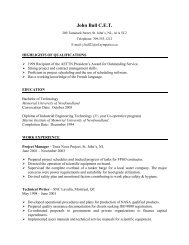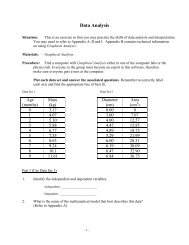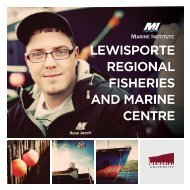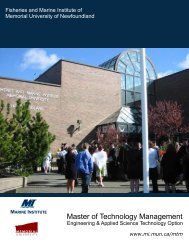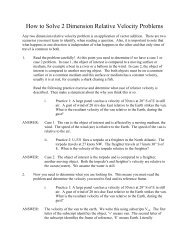Academic Calendar - Fisheries and Marine Institute - Memorial ...
Academic Calendar - Fisheries and Marine Institute - Memorial ...
Academic Calendar - Fisheries and Marine Institute - Memorial ...
You also want an ePaper? Increase the reach of your titles
YUMPU automatically turns print PDFs into web optimized ePapers that Google loves.
COURSE DESCRIPTIONS<br />
Size, scope, functions <strong>and</strong> contemporary problems of the food<br />
industry will be discussed. The laboratory component will involve<br />
a study of common methods of food processing/preservation.<br />
Food Science <strong>and</strong> Technology; Characteristics of the Food<br />
Industry; Food Constituents; Nutrition; Food Changes:<br />
Causes <strong>and</strong> Control; Food Processing; Marketing <strong>and</strong> Product<br />
Development; Speciality Foods; Issues<br />
Duration - 13 weeks<br />
Lectures - 39 hours (3 hours/week)<br />
Laboratories - 26 hours (2 hours/week)<br />
FDTE 2103 (Food Engineering Principles)<br />
This is an advanced level course designed to provide the student<br />
with a rudimentary underst<strong>and</strong>ing of food engineering principles<br />
enabling students to comprehend food engineering applications<br />
<strong>and</strong> unit operations.<br />
Introduction; Energy <strong>and</strong> Mass; Liquid Food Transport/Rheology;<br />
Energy for Food Processing; Heat Transfer in Food Processing;<br />
Refrigeration; Freezing of Food; Evaporation; Psychometrics;<br />
Dehydration of Foods<br />
Prerequisites - MATH 1200 (Calculus); PHYS 1200 (Physics)<br />
Lectures - 39 hours<br />
Laboratories - 26 hours<br />
FDTE 2104 (Seminar Series)<br />
This course will present participants with selected topics of<br />
relevance to food technology.<br />
Current Issues in Food Technology<br />
Duration - 13 weeks<br />
FDTE 2105 (Nutrition)<br />
This course provides the basics concepts in nutrition <strong>and</strong><br />
introduces the nutrients of importance to human nutrition.<br />
Nutrition Concepts; Proteins; Lipids; Carbohydrates <strong>and</strong> Dietary<br />
Fibre; Minerals <strong>and</strong> Vitamins; Water; Current Issues in Consumer<br />
Nutrition<br />
Prerequisite - FDTE 1100 (Introduction to Food Science &<br />
Technology)<br />
Lectures - 39 hours<br />
FDTE 2112 (Food Safety <strong>and</strong> Sanitation)<br />
This course is designed to introduce students to the various<br />
aspects of sanitation <strong>and</strong> to provide students the necessary tools<br />
to design, <strong>and</strong> implement <strong>and</strong> effective sanitation program.<br />
Sanitation Programs for Food Plants; Hazard Avoidance <strong>and</strong><br />
Quality Management; Cleaning <strong>and</strong> Sanitizing; Micro-organisms;<br />
Personal Hygiene; Pest <strong>and</strong> Pest Control; Food Plant Design<br />
<strong>and</strong> Equipment Design; Sanitation of Incoming Materials; Water<br />
Sanitation; Allergens; Waste Treatment; Food Regulations<br />
Prerequisite - BIOL 1100 (Biology)<br />
Duration (DU) - 13 weeks instruction<br />
Lectures (LC) - 2 hours/week = 26 hours total<br />
Laboratories (LH) - 3 hours/week = 39 hours total<br />
FDTE 2118 (Canned Foods & Thermal<br />
Processing)<br />
This is an industry training course providing competencies<br />
relevant to thermal processing operations. Principles of HACCP<br />
require that personnel be appropriately trained for roles in food<br />
processing establishments. Acts <strong>and</strong> Regulations enforced by<br />
the Canadian Food Inspection Agency require control over food<br />
contamination. The Facilities Inspection Manual, stemming from<br />
the Fish Inspection Regulations, requires that, “The designated<br />
person in control of the retort operations has successfully<br />
completed a recognized course in thermal processing <strong>and</strong> retort<br />
operation.”<br />
Introduction to Site Microbiology; Product Preparation;<br />
Processing Equipment <strong>and</strong> Procedure; Container Integrity;<br />
Post Container H<strong>and</strong>ling; Incubation; Regulations <strong>and</strong> Codes of<br />
Practice<br />
Prerequisite - High School graduation OR recommended by<br />
employer.<br />
Duration - 5 days (35 hours)<br />
FDTE 2201 (Seafood Processing Technology)<br />
This course is designed to familiarize students with the<br />
techniques <strong>and</strong> technology involved in the production of seafood<br />
products.<br />
<strong>Fisheries</strong> Overview; Preservation Methods; Primary Processing;<br />
Secondary Processing; By-products Utilization<br />
Prerequisites - QLAS 2104 (Food Evaluation)<br />
Duration - 13 weeks<br />
Lectures - 3 hours/week<br />
Laboratories - 3 hours/week<br />
FDTE 2202 (Food Processing I)<br />
This course is designed to provide students with an<br />
underst<strong>and</strong>ing of protein foods, their composition <strong>and</strong> their role<br />
in the food industry. Students are also provided with an overview<br />
of the role of the Canadian Food Inspection Agency (CFIA) in the<br />
production <strong>and</strong> processing of those foods.<br />
Business Aspects; Red Meat; Poultry <strong>and</strong> Eggs; Dairy<br />
Production; Seafood; Government Regulations<br />
Prerequisites - BIOL 1100 (Biology); FDTE 1100 (Introduction to<br />
Food Science <strong>and</strong> Technology)<br />
Duration - 13 weeks<br />
Lectures - 3 hours/week<br />
Laboratories - 3 hours/week<br />
FDTE 3100 (Food Engineering - Unit Operations)<br />
This is an advanced level course designed to introduce food<br />
engineering unit operations to students.<br />
Introduction; Preliminary Operations; Conversion Operations;<br />
Preservation Operations; Materials H<strong>and</strong>ling<br />
Prerequisite - FDTE 2103 (Food Engineering Principles)<br />
Lectures - 39 hours<br />
Laboratories - 26 hours<br />
159


